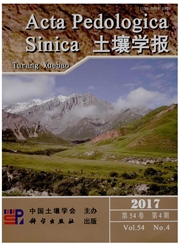

 中文摘要:
中文摘要:
采用开顶箱 (open-top chamber,OTC) 增温方法 ( 1.1-1.9 ℃),研究了长白山苔原生态系统土壤酶活性、土壤微生物生物量、土壤微生物群落结构及土壤微生物呼吸对温度升高的响应。结果表明,连续三个生长季 (6-9月) 增温,没有明显地改变土壤蔗糖酶 (58.1和45.9 mg g^-1 24 h^-1) 和纤维素酶 (0.34 和0.26 mg g^-1 72 h^-1) 的活性,但土壤脲酶活性升高80.1% (0.82和 0.46 mg g^-1 24 h^-1),过氧化氢酶活性也升高10.1% (1.18 和 1.07 ml KMnO4 g^-1 h^-1)。增温与对照条件下土壤微生物生物量碳含量 (0.85 和0.75 mg g^-1)、氮 (0.07 和0.06 mg g^-1) 、磷 (0.013 和0.011 mg g^-1) 和土壤微生物呼吸 (6.1 和 6.3 μmol m^-2 s-1) 无明显差异。相关分析表明,土壤微生物生物量月际间明显的变化与土壤含水量及土壤有机质的相对变化有关。增温改变了土壤微生物的群落结构。增温并未引起与碳循环相关的酶活性、土壤微生物生物量和土壤微生物呼吸发生明显变化,可能是短期增温及增温幅度不足以使土壤微生物活性产生明显的改变。
 英文摘要:
英文摘要:
Soil microorganisms play an important role in soil carbon and nitrogen recycling. It is, therefore, necessary to study responses of soil microorganisms to warming for better understanding soil biological processes under global warming. The technique of open-top chambers (OTC) was used in an experiment to explore responses to warming ( 1.1-1.9℃) of soil enzymes in activity and soil microbes in biomass, community structure and respiration in the soil of the tundra ecosystem on the Changbai Mountains. OTCs were established in June, 2010 and kept the temperature inside 1.1 to 1.9 ℃ higher than the air temperature around for three growing seasons consecutively. Results show that warming did not affect much the activities of soil sucrase (0.34 and 0.26 mg g^-1 72 h^-1) or cellulase (58.1 and 45.9 mg g^-1 24 h^-1), but did increased the activity of soil urease (0.82 and 0.46 mg g^-1 24 h^-1) by 80.1% and of soil catalase (1.18 and 1.07 ml KMnO4 g^-1 h^-1) by 10.1%. No significant difference was observed between warming OTCs and control plots in soil microbial biomass carbon (0.85 and 0.75 mg g^-1), microbial biomass nitrogen (0.07 and 0.06 mg g^-1), microbial biomass phosphorus (0.013 and 0.011 mg g^-1) and soil microbial respiration (6.1 and 6.3 μmol m^-2 s-1). Correlation analysis indicates that the significant monthly variation of soil microbial biomass was related to changes in soil water content and soil organic matter. Warming altered soil microbial community structure, but did not affect much carbon-recycling-related soil enzyme activites, soil microbial biomass and soil microbial respiration. Maybe the warming is not long enough in duration or not great enough in magnitude to significantly alter the activity of soil microbes.
 同期刊论文项目
同期刊论文项目
 同项目期刊论文
同项目期刊论文
 期刊信息
期刊信息
